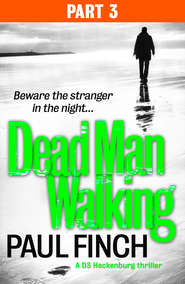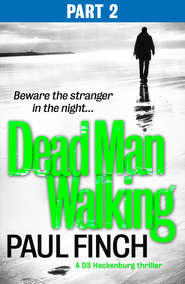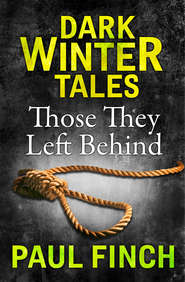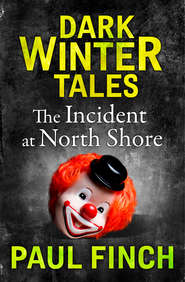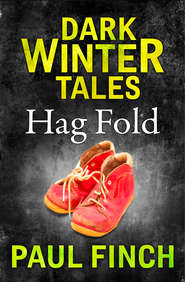По всем вопросам обращайтесь на: info@litportal.ru
(©) 2003-2025.
✖
Kiss of Death
Автор
Год написания книги
2019
Настройки чтения
Размер шрифта
Высота строк
Поля
‘Everyone’s drawn cards of a similarly nasty ilk,’ Fisher commented. ‘There are no small-time offenders on the Sledgehammer list.’
‘Two of us for each one,’ Heck mused. ‘How much actual support are we going to get?’
Fisher shrugged. ‘As many PSOs as you can scrounge out of whichever force area you end up working in. But that’ll be down to you.’
Heck glanced at him. ‘For real?’
‘Yeah. Times are hard all over, pal. The word is the UK can’t afford coppers any more.’
They turned and saw that Gail had reappeared and had been listening to the conversation.
‘No pressure then,’ she said.
Chapter 6 (#ulink_13adcdb2-0c52-5fb8-8214-f0df3ac01462)
It always struck Nan as odd that August, which so many folk thought of as the height of summer, was actually more like its end. OK, the schools were closed and people went away, and it was generally the warmest, driest month in the calendar, but the hours of daylight were noticeably shorter than they were in June, when the official midsummer fell.
It particularly took her by surprise that evening, when she opted to walk home from the Spar, having just worked the back shift, and pick up a fish-and-chip tea on the way. It was only half past eight when she left the building by the side door, but already it was going dark. Unnerved, she followed the side passage to the shop’s small forecourt, where she encountered another problem: that irritating bunch of school-age hooligans who always hung out here in the evenings. Yes, they were only kids, and Nan was forty-eight, but she wasn’t a particularly tall or powerfully built woman, and the age gap counted for so little these days. During her own childhood, adults had ruled the roost, way more than was even remotely reasonable. But it still felt wrong that she should be frightened of these youngsters, even if it was inevitable given their rat-like faces and their habit of using obscene words every other sentence with no fear of consequence.
The profanity didn’t bother her, if she was honest. Not after the youthful home life she’d led. And anyway, you couldn’t really blame them for that when it was so routine. Every new movie was full of it; comedians on TV used it to get laughs instead of actually being funny. No, it wasn’t the bad language that she hated; it was the name-calling.
‘Oy, Toothless Mary!’ one of them shouted as she walked away, huddled inside her anorak, clutching her handbag tightly.
Cackles of heartless laughter sounded from the rest of them.
She’d hoped that with it being dusk, they wouldn’t have noticed her. No such luck.
‘Oy, Toothless!’ one of them called again, as she crossed the road towards the chippie.
Nan was determined not to cry, reminding herself that this was entirely her own fault. Last February, it had been. It was wet, miserable, bitterly cold – and she’d had the sniffles. How ridiculous of her, though, to hit a sneezing fit just after she’d finished work. How even more ridiculous that she hadn’t fixed her dentures properly, four of them shooting out of her mouth and scattering across the pavement the very second she’d entered the forecourt.
They would never let her forget it.
No, she wasn’t going to cry. But she wasn’t sticking around either. Through the smeary rectangle of the chip shop window, she saw there was nobody waiting at the counter. On one hand, that might mean that Nan would get served quickly, but on the other it might mean that, at this time of evening, nearly everything had gone. If that was the case, they might have to fry her a new piece of cod, and that could take ten minutes. There’d be nothing to stop one of those callous young brutes traipsing across the road to amuse himself even more at her expense. It was better just to vacate the district, she decided. She’d have some bread and butter when she got home.
As it was now mid-evening, and full darkness was falling, she wouldn’t normally have taken the wooded footpath known locally as the Strode, which led between the small shopping centre where she worked and her home housing estate. In truth, it sounded a bit melodramatic to call it a ‘wooded footpath’. That gave the impression of a track in a forest, but it was nothing like that really; more like two hundred yards of beaten grit with a narrow belt of trees separating it from the council playing fields on the right and a wall of shrubbery on the left, with privately owned houses beyond that. Not that this made much difference in the dark, because the Strode was only served by two streetlamps, one at either end, which didn’t do much to light it. As such, Nan wasn’t always keen to use it even during the day. But on this occasion, she didn’t think twice. She just wanted to get home, and this was the quickest route.
She pressed hurriedly on down the path. The tree trunks on her right were stanchions in deep shadow, the playing fields already invisible. The dull glow of house lamps filtering from behind drawn curtains only minimally penetrated the bulwark of vegetation on her left.
Though the end of the Strode was still a good hundred yards distant, Nan told herself that there was nothing to be frightened of. But she was undeniably alone – all she could hear was her own breathing and the steady crunch of her feet on the grit. Nervously, she peeked backward over her shoulder.
There was a figure about sixty yards to her rear.
Silhouetted against the distant glow of the streetlight, it was no more than a black, hunched outline, walking not running.
She had to look again, just to be sure.
Yes, it was only walking – though at faster-than-average speed.
Nan increased her own pace. Her breath came short and quick.
It occurred to her, somewhat belatedly, that it might be a police officer. There’d been a few of them around recently. But she couldn’t see any reason why this would be a copper. Coppers usually did one of two things: they watched from a place of concealment, or they came and knocked on your door.
They didn’t do this: follow you round at night, trying to frighten you.
She glanced over her shoulder again, walking even faster, wishing she had longer legs. Even without running, this guy might catch up before she reached the main road. However, he wasn’t significantly closer. She faced forward again and saw that she only had another fifty yards to go. Unless he started running at the last minute, she ought to make it – and he surely wasn’t going to do that, otherwise he’d already have done it. As she approached the end of the pathway, she looked back one more time. He was still forty yards off and still no more than a silhouette.
With a sense of relief, she emerged onto the pavement, into the yellow radiance of the streetlights. She made a sharp right and continued on her way.
Just ahead, on the other side of Orchard Park Road, there was another cut-through, ‘the Ginnel’ as they knew this one, which passed between the rear fences of houses before opening onto her estate. In daylight hours, it was an easy and safe shortcut home. But she certainly wasn’t chancing it now; she would stay on the main road.
There wasn’t a great deal of traffic about. But it didn’t matter. Nothing would happen to her while there were occasional cars flitting by. She felt certain of that. You heard some bad stories, of course. If she was honest, this wasn’t the best part of town to live in. But it was only at the godforsaken times of night when people Nan knew had been mugged.
Assuming that was what this was.
She’d almost given up on the idea that it could be one of those stupid kids from the Spar. If it was, he’d come an awful long way simply to laugh at her again.
She glanced back, now seeing no one on either side of the road. A break occurred in the intermittent traffic, so she crossed over. The entrance to the Ginnel was about ten or twenty yards behind her, but thirty yards beyond that, the mouth to the Strode stood in the shadow of several sycamore trees. The man could be waiting there, watching her, and she wouldn’t know it. It was difficult to see where else he could have gone. Even if he hadn’t been following her, shouldn’t he be out here on the main road somewhere? She put the question from her mind. There was no point puzzling over something when you didn’t have all the facts. He could live close by and have already gone indoors for all Nan knew.
She continued on, her breathing coming easier as she turned down a side street and entered the estate. She was almost home now. Circling a block of council maisonettes, she cut across an open green space, beyond which lay the subway – another poor choice at night, but there was no real option. After that, she’d be at Hellington Court, the horseshoe-shaped apartment house on whose first floor she lived. But then she caught movement in her peripheral vision, at the bottom end of the Ginnel in fact.
Nan hadn’t taken the shortcut. But he had.
Undoubtedly, it was the same figure, though now much closer; hands tucked into his front pockets, a hood pulled down over a lowered head as though he was walking through driving rain – or trying to keep his face concealed from CCTV cameras.
‘My God,’ she whimpered, her heart hammering her stick-thin ribs as she broke into a run.
It was a perilous course. The green was strewn with bricks and bottles, any one of which could turn her ankle, but she stumbled on blindly, risking another glance backward. He too was on the green, head still bowed. Not running, but walking much faster, as if he couldn’t allow her to get too far ahead.
‘Oh my … my God,’ Nan gibbered.
Fear applied wings to her heels. She sped on, tripping only once, but though she tottered and stumbled, she managed to right herself before falling.
Just ahead, the steps led down into the subway. She took them without hesitation.
Another quick glance showed that he was about twenty yards to her rear.
At the bottom of the steps, she dashed up the concrete passage. Of the thirty-odd lights installed along its damp ceiling, only a few worked, filling the tunnel with gloom.
With a series of echoing thumps, feet descended the steps behind her. Gasping with terror, Nan staggered on. The end of the passage was clearly visible thanks to the streetlights beyond it, but it was still some forty yards ahead. Before that stood the long-abandoned relic of a pram, nothing now but corroded framework and shreds of upholstery. She thought about grabbing it and flinging it behind her to create an obstacle. But a voice told her to act her age, because that only worked in films.
She looked back again. Incredibly, he was still walking, not running; even more incredibly, he was much closer. She could make out the details of his clothing: grey tracksuit pants; a black hoodie top with some faded insignia on the front.
With a shriek, she ran into the pram.
How ridiculous, she thought, as she seesawed over the top of it, landing hard on the wet, grimy floor. She’d dismissed the idea of using the object against her enemy because it probably wouldn’t have worked and then had fallen foul of it herself.
A fastener snapped open and the contents of her handbag skittered out, but Nan didn’t wait to regather them. She jumped to her feet, which was some achievement considering that she’d winded herself, grazed both her hands and hurt her left hip – the latter stung abominably where a piece of jagged metal had torn through her clothes and punctured the flesh – and lurched on, aware that he was less than ten yards behind her. When she got to the steps, she hammered up them, expecting to hear an explosion of footfalls as he finally started running.







